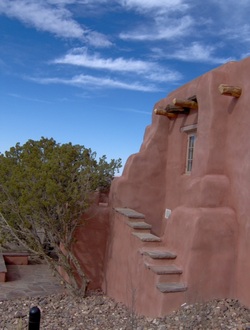
Beautiful, and I am grateful to have such opportunities. It reminded me of the epiphany I had a few days ago as I watched the sun from another angle, this later in the afternoon. The light must have hit me just right, for I was filled with an absolute contentment - not the type that you get at the end of a long, productive day, but a fuller sort, where everything is as it should be, perfect and complete, and you would not have it any other way. This attitude has come to me frequently of late, and it brings with it the idea that I want for nothing. Not only that, but that anything else but being and that which is necessary for life is not only unnecessary, but ridiculous. No money or treasures or prestige can tempt me at such times, for they seem as remote from my own desires as my childhood wishes for more plastic dinosaurs. On thinking about this, I recall Orson Well's movie, Citizen Kane.
A story about a poor boy suddenly made rich, it begins with him in his Colorado home, sledding on a hillside with the other boys, laughing. On his sled is the maker's mark "Rosebud." He is summoned by a woman - his mother, I presume - to come into the house, where he is told about his new-found wealth, which leads quickly to his attendance at boarding school, posh college, a publishing and political career and so on, finally landing him at in a vast estate where an ever-increasing debauchery is matched by ever-increasing bitterness with life. He dies in his vast hall, his last words being, "Rosebud."
If I got some of the details wrong, forgive me. It is all about Rosebud, after all, which I knew instantly after watching it in my college film class. Yes indeed, that would be on the test. The answer to it seemed easy - he had preferred his homily life to the grandeur of wealth and power. That was the answer I put on the exam, and it was the right one. But now I wonder. Whether Wells intended it or not, I believe the real answer was this: the boy was living the epiphany. Life had peaked, all was well with the world. Perhaps because of his age he could not know it, but in later life he began to understand that this sense, this being with what is, this recognition of the value of existence in and of itself, is everything. It is what money and power are meant to bring, but can never do so. It is an inward sense and there is simply no comparison to it with wealth - the former towers over the latter like the sun over a hill.
Yes, I know it as a truism that has become cliche, but it is nonetheless true. When you feel it, you know it is so. And this explains what Jesus meant when he said: suffer the children; the meek shall inherit the earth; and, the lowest shall become the highest. People have had fun with these contradictions for some time because they have forgotten what they once knew: that having nothing in innocence is the greatest joy we can have. It's the boy on his sled; its the old man in just the right sunlight; and it might be the millionaire on his yacht, but it is not the yacht that gives the pleasure, but the simple sense of being. And this simple sense is most easily sensed when one is simple - lowly, childlike, having nothing - that is, free, if we can know it. If we can know we are free, we are, and that is the great joy. Free of everything but our God-given essence, free as one eternal being in eternity. FK
 RSS Feed
RSS Feed